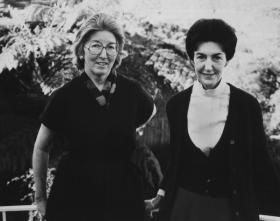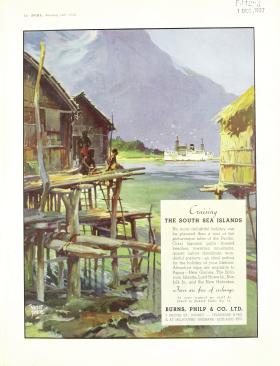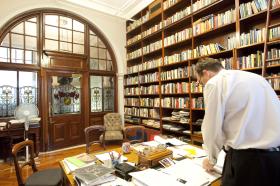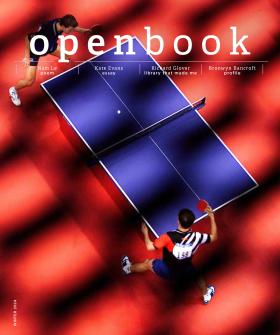Applications for the first Fellowship offered by the State Library of NSW closed on 1 October 1974. The CH Currey Memorial Fellowship — ‘to promote the writing of Australian history from the original sources’ — was not for a single Fellow, but for three Fellows.
The first three recipients of the Currey Fellowship — Keith Johnson, Winston McMinn and John Bennett — undertook local, political and legal history projects. They helped to set the scene for what is now an intellectually rich and very productive Fellowships Program that supports NSW-focused research into the Library’s collections to tell us new stories about our shared past.
I have coordinated the Library’s Fellowships Program for nearly a decade. I have always recognised that the role carries a significant amount of responsibility; from selecting Fellows to helping facilitate positive outcomes that benefit individual researchers as well as the Library. When I review the half-century of scholarly activity, it is clear that my predecessors felt the same way while they oversaw remarkable projects and some significant developments in the program.
Things were a little bit different in the 1970s. The first Fellows were awarded $1000 each (worth approximately $8000 today). Since 1987 one Currey Fellow has been appointed each year, rather than three, and today they are paid $20,000. Back then, prospective Fellows needed to write to the Principal Librarian to ask for an application form to be mailed out to them. They then completed two foolscap pages in block letters. The application process is a bit simpler now. Our forms are easily accessible on the Library’s website, and they can be filled in online and submitted electronically.
‘My Fellowship was a game changer for my career as a historian. My research on the colonial Hunter Valley led to the writing of my first book, The Convict Valley, shortlisted for the Prime Minister’s Literary Awards in 2021. Without the Fellowship, none of this would have happened.’
Dr Mark Dunn (Currey Fellow, 2016)
Some things, of course, have not changed in 50 years. The early judges struggled, as have all the judges reviewing applications since, to select the best projects from so many excellent contenders; from researchers who are at the beginning of their careers through to scholars with well- established reputations. One judge wrote in a letter to his peers in 1975: ‘I find the Currey Fellowship applications no easier this year than last. Again the number is firm proof of the need for more financial assistance of a like nature.’ Through the Foundation and the generosity of our donors, the Library has responded to this need and now offers a suite of paid opportunities.
With so many accomplishments from our Currey Fellows, including landmark books of Australian history, in 1994 the Nancy Keesing AM Fellowship was established by Nancy Keesing’s husband, Dr Mark Hertzberg, a past President of the Library Council of NSW. The Fellowship was named in honour of Keesing, the author, poet and key Australian literary figure, and is for research into any aspect of Australian life and culture using the resources of the Library. Keesing Fellows have investigated topics as diverse as children’s books, culinary traditions, the performing arts and queer Sydney.
Dr Chi Chi Huang (Keesing Fellow, 2024)
‘It really spurs me along to know people from outside of academia are interested in my research. But I think the most rewarding thing about being a Fellow is the continually developing conversations with the librarians, they really are a font of knowledge and great advice.’
The year 2007 saw the establishment of another two Fellowships, both made possible by John Merewether, the great-great-nephew of David Scott Mitchell, to celebrate the centenary of Mitchell’s bequest to the State Library and the people of NSW. The Merewether Fellowship encourages and supports the use of the Library’s collections for the study and research of nineteenth-century NSW history, while the David Scott Mitchell Fellowship supports the study and research of Australian history across any time period.
Dr Peter Hobbins (Merewether Fellow, 2016)
‘The Fellowship gave me an unprecedented opportunity to engage with a slice of the Library’s collections, locating unexpected finds like an 1830s list of Tasmanian plants, and a tear-stained letter from a grief-stricken widow.’
Dr Effie Karageorgos (Mitchell Fellow, 2023)
‘My Fellowship gave me the time, space and support — from excellent librarians — to fully immerse myself in anti–Vietnam War activism. Researching a protest movement that publicly manifested in the streets and squares surrounding the Library has been a definite career highlight.’
The Mitchell and Merewether Fellows have made research contributions that change the way we talk about publishing, reading, our natural history and so much more, from the Sydney wars between Indigenous people and European colonisers to winemaking.
An anonymous donor supports the Australian Religious History Fellowship, established in 2010. This Fellowship is for the study and research of any aspect of Australian religious history, of any faith, using the Library’s collections and other collections to support the generating of new knowledge. The topics have been more eclectic than you might think, with these Fellows researching a wide variety of doorways into faith, including missionaries, feminism, ethics and a couple of church-based scandals.
Associate Professor Jan Láníček (Australian Religious History Fellow, 2021)
‘The Fellowship was my first major research recognition in Australia. Both the Fellowship and the Library’s holdings allowed me to develop my major research project on the Holocaust, which is now supported by the Australian Research Council.’
Our most prestigious Fellowship is the Coral Thomas Fellowship, inaugurated in 2015 by Rob Thomas AO in honour of his mother, Coral Kirkwood Thomas (née Patrick). This Fellowship encourages deep and focused research into Australian culture, history and society. Offered every two years, the first Thomas Fellow was Dr Rebe Taylor in 2016, followed by Professor Grace Karskens, Professor Sally Young and Professor Sean Scalmer. Originally valued at $75,000, this Fellowship now provides $110,000 in financial support.
Professor Sean Scalmer (Coral Thomas Fellow, 2022–23)
‘The Fellowship provided time with important archival collections, encouragement that my planned research was of interest to others, and membership of a community of esteemed scholars. It transformed my immediate horizons, making possible research and writing that would otherwise have been impracticable.’
The current Thomas Fellow is Associate Professor Nancy Cushing. Over her two-year term, she will be producing a book to be called Beauty and the Beasts, a history of animals in Sydney. A more recent addition to our program is the Dr AM Hertzberg AO Fellowship to support research into any aspect of the social, cultural and political history of industry and manufacturing in Australia. Just as Dr Hertzberg remembered his wife with the Keesing Fellowship, his children have chosen to honour his legacy by providing financial assistance to researchers. Hertzberg Fellows have reinterpreted histories of the way money was made in the early years of the colony, the growth of the union movement, and innovations in a burgeoning construction industry.
Dr Elizabeth Humphrys (Hertzberg Fellow, 2019)
‘Perhaps the thing I treasure most about my Fellowship was the feeling you had been welcomed into a big family of scholars, librarians and support staff, all of whom are engaged in protecting and using collections’ materials for public benefit.’
Academic and Francophile Ross Steele recently created the Ross Steele AM Fellowship to support research into the Library’s glorious pictorial collections. First awarded in 2020, Steele Fellows have produced original research, publications and a stunning exhibition recovering the life and art of Charles Rodius, one of Australia’s best early artists, by the inaugural Steel Fellow, Associate Professor David Hansen who sadly passed away earlier this year.
Professor Robert Phiddian (Steele Fellow, 2021)
‘Being a Fellow gave me the opportunity to do sustained work on an unparalleled collection of Australian cartoons and graphic satire. It meant concentrated periods of archival happiness were feasible, and the enthusiastic and expert support from Library staff at all levels made my research time a joy.’
Such generosity continues. The Library has recently announced that an anonymous donor will make it possible for a writer to work with our collections to produce a piece of fiction or non-fiction in any genre. Applications for the Imago Fellowship, which is valued at $50,000, are open now, with first Imago Fellow starting work in early 2025.
It is easy to collate a list of interesting things that our Fellows have done over the years. The physical outputs of journal articles, book chapters and full-length books can be placed in an impressive stack on a table. They have also given detailed and lucid Scholar Talks, nearly all of which are available online. What is harder to calculate, but is as important as any tangible achievement, is how receiving a Fellowship can change someone’s life.
In 1981 the Library awarded a Fellowship to ‘Miss CA Liston’ for her project ‘A Study of Sir Thomas Brisbane, Governor of NSW 1821–25’. In a recent conversation with me, the recipient recalled: ‘Thinking back on the CH Currey
Fellowship now, I realise it was important in ways that I didn’t recognise at the time.’ She talked about how the funding, supplemented by some earnings from part-time jobs while completing her doctorate and a Sophia Wood Travelling Scholarship from the University of Sydney, supported a six-month research trip to the United Kingdom. ‘I spent time researching military history in London for Brisbane’s military career, scientific sources in London and Edinburgh for his astronomy, weeks in Glasgow for the Brisbane family papers that Phyllis Mander Jones had told me about but which she had never included in her Manuscripts in the British Isles (as they were about the family not his time in Australia), and more weeks in Edinburgh at the National Library of Scotland unravelling his personal and family links after he returned from New South Wales.’
Being a historian can transport you to another place and age. Sometimes, though, history-in- progress can pull you uncomfortably back to the present. Liston remembers of her research trip that ‘it was also the Falklands War. I was staying with elderly friends in Edinburgh, and we spent the evenings glued to the radio, as TV coverage was full of troop ships loading men to go off to war, but it was also censored; it was the radio reports that gave us news.’
‘At the end of six months, I knew I couldn’t write a full biography,’ Liston says, ‘not because there wasn’t enough material, but because my interest and knowledge were about Australian colonial history. Brisbane was born in 1773 and died in 1860 — and only four of those years were spent in New South Wales.’ And so, for this scholar in the first months of her career, the Fellowship facilitated ‘a valuable scoping exercise. More tha the other early governors, it was the diversity of his life experiences that was too big for me at that point in my career. I returned and put my efforts into early colonial history with no regrets.’
Those familiar with the scholarship of our colonial past may recognise the name ‘Liston’; the young woman who was a Library Fellow in the early 1980s is now better known as Carol Liston AO, Adjunct Associate Professor and Whitlam Institute Fellow at Western Sydney University. Her work on colonial NSW continues to make a difference to how we see our shared past.
Library donors have also supported specific Fellowships, including the Purves Environmental Fund and Conservation Fellowship (2008) and the Milt Luger Fellowship (2004–08). The Library also offers support that is not financial, with unfunded positions that are highly sought after. The Artist in Residence initiative, for example, has allowed people such as John Bokor and Wendy Sharpe to produce creative works based on the Library’s collections and buildings.
In addition, for several years from 2003, the Library offered two Honorary Fellowships to the first runners-up for the Currey and Keesing appointments. In 2019, these Honorary Fellowships were reimagined as Visiting Scholars, the number of positions was expanded, and people could apply for them directly. One of the key motivations behind this change was to facilitate more opportunities for students and creative practitioners. This has allowed the Library to build a real sense camaraderie in this community of scholars.
Dr Kelly Lewer (Visiting Scholar, 2019)
‘My research on experiences of women who had undertaken university studies after leaving a violent relationship led me to Elsie’s Refuge: Australia’s first official women’s refuge. The Library offered opportunities to do this work. It was a delightful experience which I will always treasure and appreciate.’
My goal for the program is to offer practical assistance, but to also build a sense of value: I want all the effort that it takes to become a Fellow to be worth it. I want being one of the Library’s Fellows or Visiting Scholars to be li reading a terrific book or viewing a fabulous exhibition; you might not remember every line you read or every object you saw, but you do remember how you felt while you were doing it.
This is not an easy goal to measure, but I do see success in how so many of the researchers the Library supports want to give back to the program. Many of our Fellows and Visiting Scholars give their knowledge and their time to our public events and our learning activities. Some return as judges for the next intake of researchers. Many have contributed to our collections, adding oral histories or highlighting materials we can add to our already rich holdings. For Dr Lisa Murray, being a Fellow also gave her ‘the opportunity to give back to the State Library and the research community by contributing item descriptions and cataloguing corrections based on my research thereby improving access to the collection’.
Dr Lisa Murray (Hertzberg Fellow, 2021)
‘I was thrilled to receive the Hertzberg Fellowship to tap the depths of the Tooheys Limited collection. The Fellowship granted me, as a public historian, the space for professional development, to devote time to open up a new area of research and expertise. This gave me the confidence to move into the next phase of my career.’
In many ways, research is a strange sport: it requires a team approach, but it can also be isolating. The archive is not always very giving, so there can be wins and losses as you carefully examine boxes of materials. There are occasional moments of public adulation (as well as rare bouts of controversy), but most of the work is done in private: a quiet table in the Mitchell Reading Room during the day, or in a home or work office late into the night. The Fellowships themselves are incredibly competitive, and most of our Fellows have years of training behind them. The rewards also take a few seasons to materialise. The work of our Fellows might not be seen until several years after their time at the Library. Like any sport, we all have our supporters and detractors. The odd rivalry. Feelings of exhilaration and exhaustion. Yet, for everyone who has played the game there are very few who would do anything else.
Suzanne Smith (Visiting Scholar, 2024)
‘This opportunity has been pivotal for me and my novel set during the Vietnam War. The stories and archive I have been able to access at the State Library have dramatically changed the plot and storylines, and lifted the whole narrative to another level.’
During the almost ten years that I’ve looked after the Library’s Fellows, there have been a few interruptions. These include six months when I worked as a curator, a stint as the Head of Public Programs, undertaking the co-design and co-delivery of training to support the Library’s new online catalogue, a global pandemic, and co-editing with Mitchell Librarian Richard Neville Reading the Rooms: Behind the paintings of the State Library of NSW (NewSouth, 2023). But much has still happened to build a program that has changed the careers, and the lives, of so many people: the expansion of Fellowships with Fellows working across centuries and topics, an increasingly diverse and productive Visiting Scholars team, and the opening of the beautiful Donald and Myfanwy Horne Room in 2018 as a dedicated space for the Fellowships Program.
The most rewarding aspects of my role have all revolved around the Library’s researchers. I have found myself being an administrator, advisor, career counsellor, librarian, research assistant, all-round wrangler as well as social worker when required. And, an unexpected privilege, I have also been a friend. I never take for granted that in one of Australia’s greatest research institutions, I have one of the best jobs on the books.
As the Fellowships Program at the Library turns 50, it is wonderful to reflect on how much work has been done. A total of 179 funded Fellows — 95 women and 84 men — have been awarded over $2.6 million. In addition, over 70 unfunded Artists in Residence, Honorary Fellows and Visiting Scholars have been supported in their research. In welcoming the Library’s largest ever cohort of researchers into the Program in February 2024 — 8 Fellows and 18 Visiting Scholars — it is also wonderful to think about what is to come.
The Library Fellowships
Coral Thomas Fellowship: $110,000
Imago Fellowship: $50,000
Nancy Keesing AM Fellowship: $25,000
Australian Religious History Fellowship: $20,000
CH Currey Fellowship: $20,000
Dr AM Hertzberg AO Fellowship: $25,000
Merewether Fellowship: $12,000
David Scott Mitchell Fellowship: $12,000
Ross Steele AM Fellowship: $12,000
Summer Scholars: $1000
Visiting Scholars are also appointed by the Library (unfunded).
Dr Rachel Franks holds PhDs in Australian crime fiction from Central Queensland University and in true crime texts from the University of Sydney. She is the Library’s Coordinator, Scholarship.
This story appears in Openbook winter 2024.




